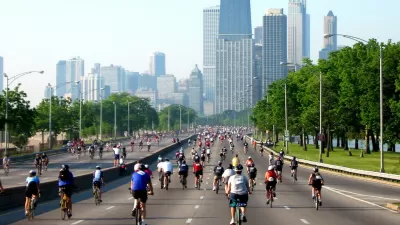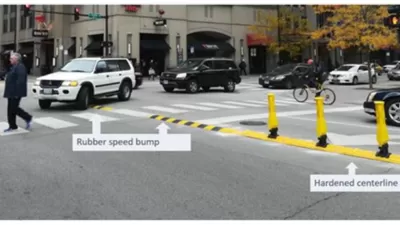Chicago is following in the footsteps of cities around the country (a few years behind the pack) in adopting a Vision Zero plan to eliminate traffic deaths and serious injuries by 2026.

John Greenfield reports on the city of Chicago's announcement this week of a Vision Zero plan to eliminate traffic deaths and serious injuries by 2026. The plan's delivery is slightly overdue, after the Rahm Administration promised the plan in fall of 2016, but Greenfield writes "[that] the important thing is that Chicago is finally getting moving on this crucial mission to reduce the carnage on our streets, where currently dozens of people are injured in crashes every day, and more than 100 people are killed in collisions each year."
Greenfield's analysis first approaches the Vision Zero plan from the angle of equity. "As I’ve discussed before, since the Vision Zero efforts will be focused on these High Crash Areas, which are largely lower-income communities of color, it’s important that any increase in traffic enforcement be done in an equitable way," writes Greenfield. The city already has a problem with giving a disproportionate number of tickets for bike infractions to Black residents of the city, as a March report revealed.
As for the capital investment components included in the plan, Greenfield reports:
Under the three-year plan, CDOT plans to improve 300 intersections to make them safer for pedestrians. CDOT will also work with the CTA to improve access and safety at 25 stations, encouraging the use of transit through targeted safety improvements in the vicinity of CTA stations and bus stops, particularly in high crash zones.
Mary Wisniewski also reports on the new Vision Zero plan in a separate article for the Chicago Tribune.
FULL STORY: At Long Last, the City Releases the Chicago Vision Zero Action Plan

Alabama: Trump Terminates Settlements for Black Communities Harmed By Raw Sewage
Trump deemed the landmark civil rights agreement “illegal DEI and environmental justice policy.”

Study: Maui’s Plan to Convert Vacation Rentals to Long-Term Housing Could Cause Nearly $1 Billion Economic Loss
The plan would reduce visitor accommodation by 25% resulting in 1,900 jobs lost.

Planetizen Federal Action Tracker
A weekly monitor of how Trump’s orders and actions are impacting planners and planning in America.

Wind Energy on the Rise Despite Federal Policy Reversal
The Trump administration is revoking federal support for renewable energy, but demand for new projects continues unabated.

Passengers Flock to Caltrain After Electrification
The new electric trains are running faster and more reliably, leading to strong ridership growth on the Bay Area rail system.

Texas Churches Rally Behind ‘Yes in God’s Back Yard’ Legislation
Religious leaders want the state to reduce zoning regulations to streamline leasing church-owned land to housing developers.
Urban Design for Planners 1: Software Tools
This six-course series explores essential urban design concepts using open source software and equips planners with the tools they need to participate fully in the urban design process.
Planning for Universal Design
Learn the tools for implementing Universal Design in planning regulations.
Caltrans
Smith Gee Studio
Institute for Housing and Urban Development Studies (IHS)
City of Grandview
Harvard GSD Executive Education
Toledo-Lucas County Plan Commissions
Salt Lake City
NYU Wagner Graduate School of Public Service





























